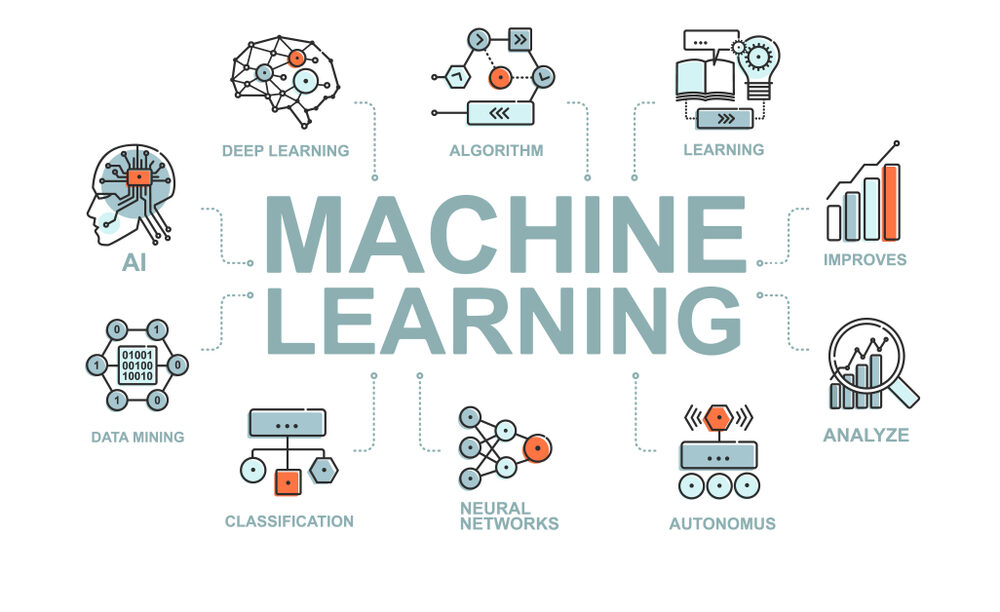Machine learning
Machine learning
Machine learning is a type of artificial intelligence that allows software applications to become more accurate in predicting outcomes without being explicitly programmed. This is achieved through the use of algorithms that iteratively learn from data, allowing the software to improve its performance on a specific task over time.
One of the key advantages of machine learning is that it allows computers to learn and adapt to new data without being explicitly programmed to do so. This allows machine learning algorithms to be applied to a wide range of problems, such as image recognition, natural language processing, and even self-driving cars.
There are several different types of machine learning, including supervised learning, unsupervised learning, and reinforcement learning. In supervised learning, the algorithm is trained on a labeled dataset, which means that the correct output is provided for each example in the training data. This allows the algorithm to learn the relationship between the input and the output, and to make predictions on new data.
Unsupervised learning, on the other hand, does not use labeled training data. Instead, the algorithm is given a dataset and must find patterns and relationships within the data on its own. This type of machine learning is often used for clustering and dimensionality reduction.
Reinforcement learning is a type of machine learning that focuses on training algorithms to make decisions in a dynamic environment. In this type of learning, the algorithm is not given the correct output for each example in the training data. Instead, it must learn through trial and error, receiving feedback in the form of rewards or punishments for its actions.
Overall, machine learning has the potential to revolutionize a wide range of industries and applications. From improving the accuracy of medical diagnoses to enabling self-driving cars, the possibilities are endless. By allowing computers to learn and adapt to new data, machine learning has the power to transform the way we interact with the world around us.
Machine learning was first coined as a term in 1959 by Arthur Samuel, a pioneer in the field of artificial intelligence.
In 1997, a machine learning algorithm called Deep Blue defeated the world chess champion, Garry Kasparov.
In 2011, a machine learning algorithm called Watson competed on the game show Jeopardy! and defeated human contestants.
In 2012, a machine learning algorithm called AlexNet won the ImageNet Large Scale Visual Recognition Challenge, a prestigious competition in the field of computer vision.
In 2014, a machine learning algorithm called AlphaGo defeated the world champion of the board game Go, a game considered to be significantly more complex than chess.
In 2016, a machine learning algorithm called Libratus defeated professional poker players in a no-limit Texas hold 'em tournament.
Machine learning is now being used in a wide range of industries, including finance, healthcare, and transportation.
Some experts believe that machine learning will be a key driver of the next industrial revolution, allowing computers to learn and adapt in ways that were previously unimaginable.
Critics of machine learning point to potential ethical concerns, such as bias in algorithms and the loss of jobs due to automation.
The future of machine learning is likely to involve the development of more advanced algorithms and the integration of machine learning into a wider range of applications.
Machine learning is a broad field that encompasses a wide range of topics, including statistics, computer science, and artificial intelligence.
Many universities and educational institutions offer courses and programs in machine learning, often as part of a larger computer science or data science curriculum.
Some common courses in machine learning include:
Introduction to Machine Learning
Supervised and Unsupervised Learning
Deep Learning
Natural Language Processing
Reinforcement Learning
In addition to traditional classroom courses, there are also many online courses and tutorials available that cover the basics of machine learning.
Students interested in pursuing a career in machine learning may also benefit from participating in research projects or internships in the field.





Comments
Post a Comment
If you have any doubts. Please let me know.